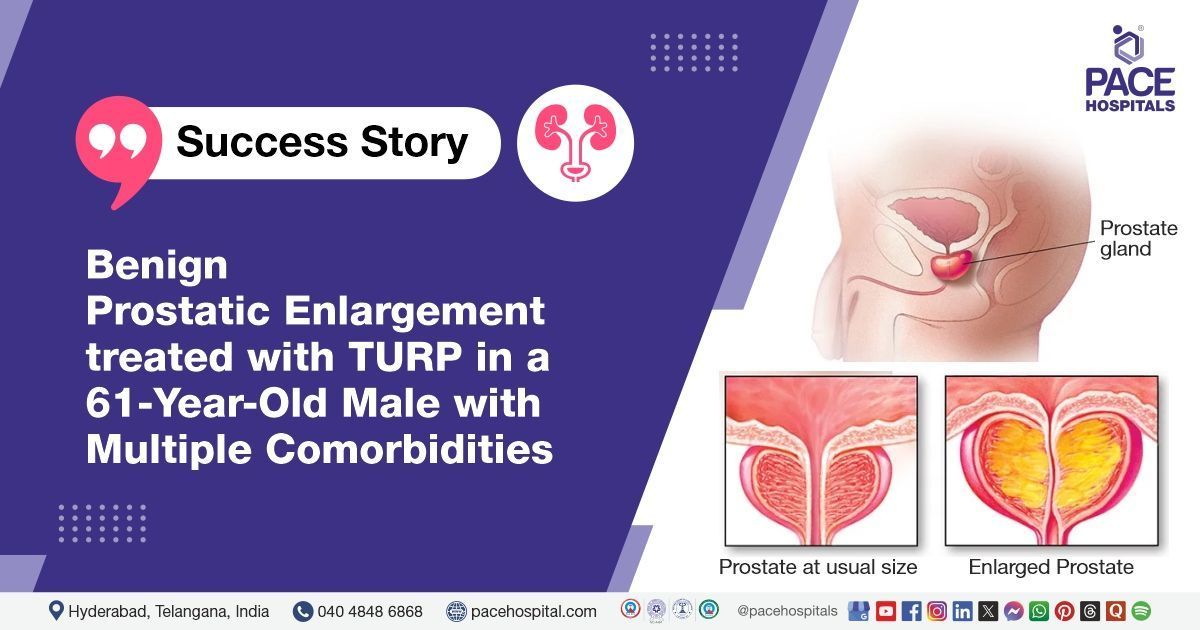TURP Surgery for Benign Prostatic Enlargement in a 61-Year-Old with Comorbidities
PACE Hospitals
PACE Hospitals' Urology team successfully performed a transurethral resection of the prostate (TURP) for a 61-year-old male with Benign Prostatic Enlargement (BPE), acute urinary retention (AUR) on a catheter, coronary artery disease (CAD), diabetes mellitus (DM), hypertension (HTN), dyslipidemia, and hypothyroidism.
A 61-year-old male patient with complaints of poor urine flow and acute urinary retention (AUR) on a catheter presented to the consultant laparoscopic urologist, Dr. Abhik Debnath, at PACE Hospitals, Hitech City, Hyderabad.
Medical History
Delving further, it was understood that the patient had complaints of poor urine flow and acute urinary retention (AUR) which led to his admission to PACE Hospitals for additional care and management.
Diagnosis
Upon being admitted to PACE Hospitals, and understanding the history and physical examination, the patient was subjected to a complete blood picture (CBP), viral screening spot, blood grouping, complete urine examination, random blood sugar, HbA1c, serum creatinine, serum electrolytes, prothrombin time, activated partial thromboplastin time and liver function tests (LFT).
Evaluating the diagnostic investigations, the patient was diagnosed with conditions including Benign Prostatic Enlargement (BPE), Acute Urinary Retention (AUR) on a catheter, coronary artery disease (CAD), diabetes mellitus (DM), hypertension (HTN), dyslipidemia, and hypothyroidism.
Benign prostatic enlargement (BPE) also known as benign prostatic hyperplasia (BPH) is the non-malignant (non-cancerous) growth or hyperplasia of prostate tissue, which is a major cause of lower urinary tract symptoms (LUTS) in elderly men.
The patient also had the inability to empty the bladder completely which is known as urinary retention. Acute Urinary Retention (AUR) occurs suddenly and lasts only a short time.
Treatment
After consultation with the consultant laparoscopic urologist, Dr. Abhik Debnath, it was determined that Transurethral resection of the prostate (TURP) surgery was the effective method for treating the patient.
A transurethral resection of the prostate (TURP) is a surgical technique that removes a portion of the prostate. TURP is usually recommended when prostate enlargement (benign prostatic hyperplasia) develops challenging symptoms and when medications do not work.
The patient had been taking aspirin regularly, but it was stopped 5 days before surgery. Aspirin can raise the chance of bleeding, so it is normally discontinued before surgery to lessen this risk. The patient had a multidrug-resistant organism (MDRO) infection caused by resistant bacteria. Meropenem and colistin were given based on lab tests showing the bacteria was susceptible to colistin.
The patient had poor blood sugar control, with an HbA1c of 9.6% and random blood glucose levels between 300-500 mg/dL. High blood sugar can complicate surgery and recovery, so it was controlled by insulin before surgery.
Performing these investigations before transurethral resection of the prostate (TURP) surgery ensures that the urologists have a comprehensive understanding of the patient's condition and anatomy, which guides them in performing the surgery effectively and helps reduce the risk of complications.
With necessary investigations done & clearances obtained which included a pre-anesthesia checkup, the patient underwent a transurethral resection of the prostate (TURP) surgery under spinal anesthesia. The procedure was supervised by the consultant laparoscopic urologist, Dr. Abhik Debnath and it was accomplished without any complications.
The aftermath
The intra and post-operative period was uneventful. The necessary medicines, β-lactam antibiotics, laxatives, analgesics and antipyretics, antacids, 5-alpha reductase inhibitors, statins, angiotensin II receptor antagonists, beta-blockers, sulfonylureas, anti-diabetic agents, alpha-glucosidase inhibitors, insulin, and other supportive care were given along with counseling. The patient was advised to continue thyroid medication and resume aspirin medication after 3 weeks, and also diabetic diet, and Kegel’s exercises were advised. The patient was recommended to take fluid around 2 L / day and to urinate at scheduled times to help manage bladder control. And to double voiding (to urinate then wait a few moments and try to urinate again to fully empty the bladder.). He was also advised to avoid tea/ coffee/ spicy foods/ weightlifting and forward bending, straining at stool, and prolonged travel on bus/auto/two-wheeler.
He was explained that mild flank or suprapubic discomfort or a small amount of blood passage in urine /cloudy urine /mild burning may occur, but these symptoms usually resolve within 7- 10 days.
He was discharged in stable condition with a Foley catheter (a thin, flexible catheter to drain urine from the bladder) in situ.
The patient was also instructed to contact the
emergency ward of PACE Hospitals immediately in case of fever, abdominal pain, or vomiting. After 5 days, the patient was asked to follow up with Dr. Abhik Debnath for catheter removal.
Share on
Request an appointment
Fill in the appointment form or call us instantly to book a confirmed appointment with our super specialist at 04048486868
Appointment request - health articles
Recent Articles











